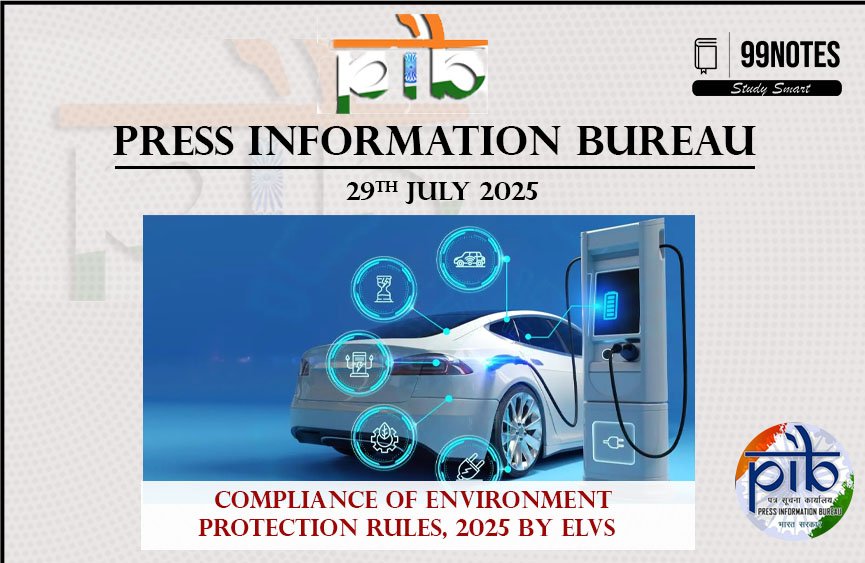29 July 2025: PIB Summary For UPSC
1. Compliance of Environment Protection Rules, 2025 by ELVs
Source – Press Information Bureau (PIB) – Ministry of Jal Shakti (29 July 2025)
|
Topic: GS 3 (Environmental Pollution and Management; Sustainable Development) |
|
Context |
|
Content:
Background
-
The Environment Protection (End‑of‑Life Vehicles) Rules, 2025 (S.O. 98(E), dated 6 January 2025) formalised producer responsibility for ELVs in India.
-
These rules apply to all transport and non‑transport vehicles, excluding agricultural tractors, trailers, combine harvesters, and power tillers.
Key Provisions
-
Extended Producer Responsibility (EPR):
Producers must meet annual scrapping targets based on vehicles sold 15 years earlier (transport) or 20 years earlier (non‑transport). -
Vehicle Scrapping Infrastructure:
-
RVSFs (Registered Vehicle Scrapping Facilities) must perform de‑pollution, dismantling, segregation, and scrapping.
-
Recovered recyclables go to registered recyclers/refurbishers/co‑processors; hazardous materials go to authorised Common Hazardous Waste Treatment facilities.
-
-
Collection Mechanism:
-
Producers must designate Collection Centres (or use their own sales/service outlets) and publicise them online and at sites.
-
Vehicle owners must deposit ELVs within 180 days of the vehicle becoming end‑of‑life.
-
-
Registration & Compliance:
-
Producers register via CPCB’s centralised portal; RVSFs and bulk consumers register with their respective SPCB/PCC.
-
CPCB (for producers) and SPCBs/PCCs (for RVSFs/bulk consumers) are empowered to inspect, audit, suspend, or cancel registrations for non‑compliance.
-
-
Reporting & Enforcement:
-
Producers, RVSFs, and bulk consumers must file returns online regarding fulfilment of obligations.
-
Violation entails environmental compensation penalties enforceable by CPCB or SPCB/PCC.
-
-
Oversight & Implementation Committee:
-
MoEF&CC has formed an implementation committee (chaired by Chairman, CPCB) with stakeholders from all relevant ministries and industries to ensure effective rollout.
-
-
Related Schemes & Policies:
-
MoRTH’s V‑VMP (Voluntary Vehicle Fleet Modernization Program) supports phasing out old vehicles.
-
Motor Vehicles (Registration & Scrapping Facility) Rules, 2021 and Steel Scrap Recycling Policy, 2019, along with CPCB guidelines from 2023, support environment‑sound ELV handling.
-
Analysis for UPSC
-
Importance of EPR in environmental governance:
EPR shifts accountability upstream to producers, aligning with circular economy goals. -
Alignment with Sustainable Development Goals (SDG 12, SDG 13):
Promotes resource efficiency and addresses environmental pollution through sound waste management. -
Challenges & Implementation Risks:
-
Monitoring compliance across dispersed producers and unorganised sectors.
-
Ensuring capacity and geographical coverage of scrapping and recycling facilities.
-
Consumers’ awareness regarding legal deadlines and procedures.
-
-
Opportunities:
-
Expand formal recycling industry and green jobs.
-
Contribute to steel scrap supply chains and reduce raw‑material import dependency.
-
Stimulate technology adoption for safe de‑pollution and hazardous waste disposal.
-
Way Forward
The ELV Rules, 2025 mark a comprehensive legal framework mandating producer-led management of vehicle waste and facilitating circularity. For successful outcomes, robust capacity-building for RVSFs, effective digital tracking of EPR compliance, extensive public awareness, coordination with state pollution boards, and strict regulatory enforcement are imperative. Scaling up infrastructure and integrating informal recyclers into formal systems can enhance environmental protection and sustainability.
|
Practice Question: “Examine how the Environment Protection (End‑of‑Life Vehicles) Rules, 2025 strengthen producer responsibility in India’s vehicle scrap management. What challenges could impact effective implementation, and how can they be addressed?” |
Check this out 28 July 2025: PIB Summary For UPSC



